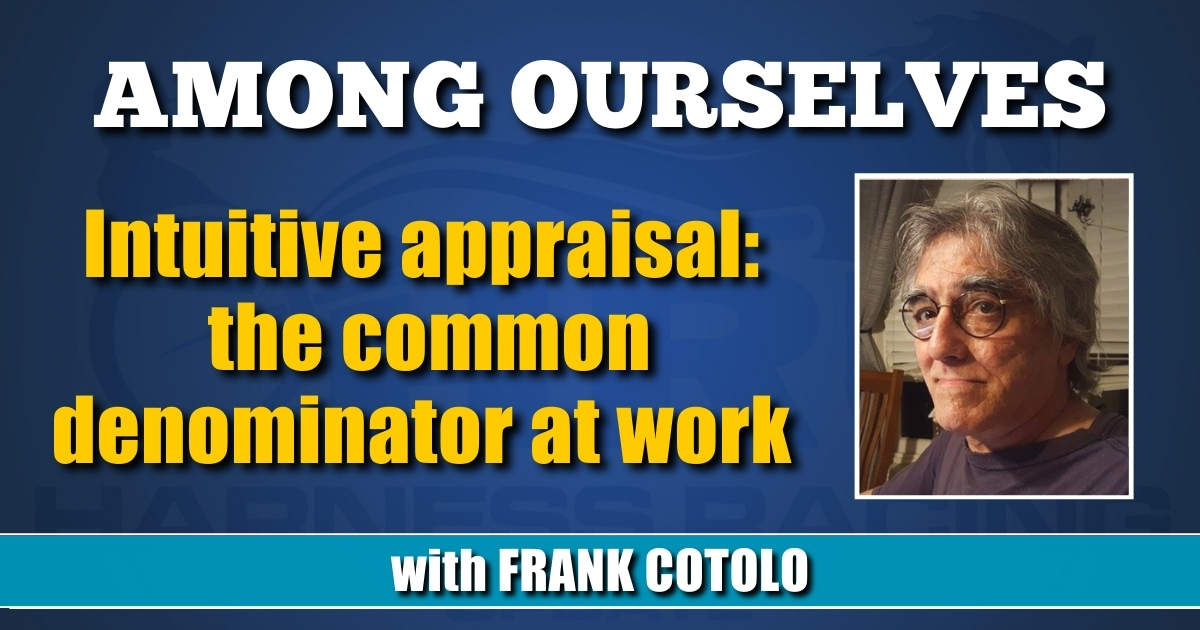Intuitive appraisal: the common denominator at work
by Frank Cotolo
I awoke to the value of my intuition once James Quinn authenticated the third element of expertise.
The search for a common denominator among the volumes of theories and math from the league of gentleman handicappers resulted in an expanding process including my trust and commitment to succeed; doing it one race at a time without denying anything I learned from brilliant mathematicians; and without a lot of work that I could not — under any circumstances — be subjected to undergoing.
A fellow horseplayer mocked me when I told him about it.
“So now you handicap with feelings,” he said.
“No. I interpret data with what I sense about the data.”
“It’s called guessing.”
I sighed quoting Barry Meadow and said, “We’re all guessing.”
There was no reason to debate anyone because it is impossible for most veteran horseplayers to understand the addition of intuition to handicapping. There were two reasons for this.
First it is because you cannot assign a number to calculate intuition as one does for speed and class. Nor does it have tenets like “always rely on bloodlines for turf and mud runners” or “always consider the importance of positive post-position changes for standardbreds.”
The second reason is intuition is not an equally shared quality in everyone. Though knowledge and experience assist in expanding its power in any brain, no two brains work alike. For instance: Who knows why General Eisenhower felt positive about invading Europe amid a bad storm while most of his counsels urged him to cancel the massive event?
I decided evaluating the potency of intuition in my brain had to be recognized as important in order to conspire with knowledge and experience to assure intimate understanding and follow-through.
I confirmed a process of adding the Quinn triad to my handicapping in a single race at Los Alamitos. I was somehow sure harness racing would be a better landscape to accept intuitive appraisal to my knowledge and experience. That decision in itself was intuitional.
I was with a friend (let’s call him Delaney) who was a pernickety handicapper when it came to thoroughbreds. He respected my prowess for handicapping harness and wanted to learn more about standardbreds in action. It just so happened he accompanied me on the correct evening as I opened the floodgates of my cerebrum for an attack on a one-mile pace (among nine others) on the five-eighths oval. I told him I was most interested in the race involving two local horses I followed.
My main focus was the sophomore pacer Dare You To (Abercrombie—Chickasaw Brave—Meadow Skipper) trained and driven by Stan Bayless. His performances proved he was national material (and later he would perform against pacers too good for California).
The second was the Bob Johnson-trained Two Oceans (driven in this race by Joe Anderson). There was no way this older pacer was going to beat Dare You To, said I, but the son of Lumber King (alien to me) had a penchant for finishing in the top three on the circuit. A good earner. And Anderson at the time was a perceptive driver who finished in the money a near 60 per cent of the time.
“That’s it?” Delaney said. “Not much of an argument.”
“I don’t want an argument. I want an exacta. Cold.”
Delaney sensed my enthusiasm even though I said I have nothing else to defend this combination. It’s Dare You To with Two Oceans completing the exacta. Boom.”
To my surprise the betting crowd (at that time limited to those in attendance) was softer on Dare You To than I predicted. Good for me. As for Two Oceans? He was not the second or third choice on the board. Good for me. Because in some cloistered part of my brain those two pacers fit in a cold exacta as tight as Laurel and Hardy.
“You going to box it?” Delaney said.
“Nope. Cold.”
The time to wager was ticking away. I did not hesitate and I took that to mean my knowledge and experience were in harmony with my intuition and this drove me to the window. I called a $50 cold exacta without any calculations and returned to my trackside seat.
Dare You To took complete command; the focus then became Two Oceans. He was steadfast on the inside most of the mile but tight quarters ensued and Anderson had to work him hard when a challenge threatened finishing second. In the waning moments of a Dare You To victory I began to pound the table in four-four time with a fist full of knuckles while screeching “Get up, get up, get up…” until the finish line.
“I got it!” I said because somehow, I was assured Two Oceans’ nostril confirmed my exacta.
I turned to Delaney but he was gone. He showed up when the bloated results became official. He said I scared him. I did not apologize. My intuitive appraisal was worth $570-some-odd bucks.

















